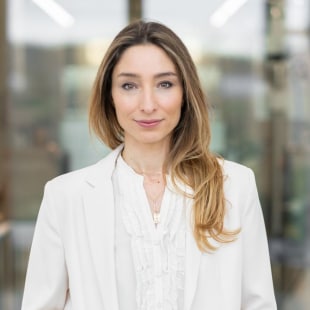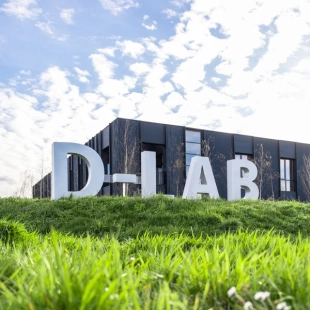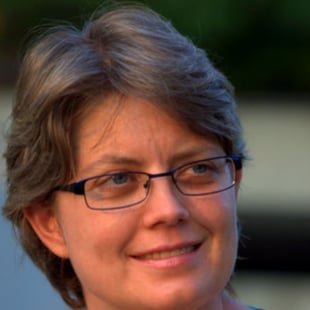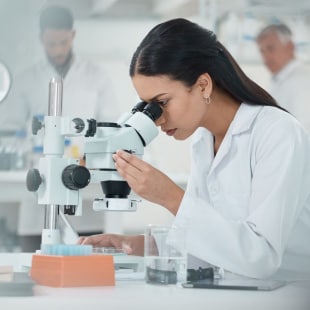Riding the boom in nutricosmetics while staying locally rooted
Meeting with Fleur Phelipeau, founder and CEO of D-Lab Nutricosmetics
You began your nutritional supplements business 15 years ago, just after getting out of business school and with just a little seed capital. Wasn’t that risky?
Fleur Phelipeau: Now that I look back on it, absolutely! But as soon as I graduated from HEC, I wanted to start my own business to address a visceral need I felt – to be actually on the ground, developing my own ideas. And since I was a child, I have been convinced that the nutritional supplements business – until then limited to pharmacies – offered some great opportunities in beauty and well-being. My parents owned Compagnie de Vichy, a spa tourism business built around the mineral water brand Vichy Célestins, whose skincare benefits are widely recognised. I grew up with the idea that beauty comes first of all from inside.
In 2010, I decided to invest in the “food cosmetics” market” by creating a startup, D-Lab Nutricosmetics, with nothing but a student loan in my pocket. This fully self-financing strategy required a good dose of patience and determination. But it ended up paying off: D-Lab Nutricosmetics now distributes more than 200 products in spas, beauty institutes and speciality perfume shops, with consolidated revenues of €10 million. We continue to grow steadily by 20% to 35% annually, which is unusual for a small business, especially as I am the sole proprietor. And exports, which currently account for 30% of sales, just keep growing. Our goal is to become a major player in nutricosmetics on a global scale.
In 2022, you moved up to the next level in building a 2,700 m2 manufacturing facility in the Allier department of France. What was your thinking back then?
Fleur Phelipeau: For several years, we had wanted to vertically integrate our activities, in order to control our entire value chain. One of the first steps in this strategy was to have our own manufacturing facility. Hence, the opening of a first factory, in Saint-Bonnet-de-Rochefort, Allier. We now want to go further in innovating and enhancing the quality of our product ranges by producing the basic ingredients ourselves. Our goal: to formulate plant-based powders with ultra-concentrated active principles, guaranteed traceability, and excellent phytochemical stability. With this in mind, we have launched a France 2030-labelled R&D programme for its innovative possibilities!
This new stage in our development process requires the construction of a second factory, for which we are backed by several banking partners, including BNP Paribas. Here again, Saint-Bonnet-de-Rochefort was a natural choice. For one thing, I am very fond of my native region. But, most of all, I believe in the collective intelligence that arises from a short value chain. Whether human contacts or safety and traceability of supplies, everything is simpler and more efficient this way. Especially as we are lucky enough to be located in a Naturopôle, which allows us to pool resources with other companies, with a constant eye on protecting the environment.
Last November you were named one of the French Women Entrepreneurs 40 in the small and mid-sized company category. What does that mean to you?
Fleur Phelipeau: This is magnificent recognition. I am proud that our atypical “startup SME” model has been recognised, especially at a time when we are making a radical change by switching to production, and when I’m planning how we can consolidate the group and accelerate our growth internationally. In addressing all these new challenges, we are fortunate enough to be backed by a strong network. Not to mention the fact that at the awards ceremony, I was able to establish some very fruitful contacts with other award-winners!
D-LAB Nutricosmetics: nutricosmetics, located in Saint Bonnet de Rochefort (Allier, France)
Established
Employees (end 2024)
Consolidated revenue
Microalgae to revolutionise the fight against cancer
Meeting with Muriel Bardor, founder and CEO of Alga Biologics
How did a professor-researcher end up heading one of the most promising deeptechs in its sector, which has been selected for the French Blue Tech index?
Muriel Bardor: My path as a business leader was indeed rather atypical. To be quite frank, I sometimes feel this famous “imposture syndrome”! It all began in 2011 at the GlycoMEV research laboratory of the University of Rouen Normandy, where I was a professor and then deputy director. In the course of my research, my team and I discovered the incredible properties of a species of microalgae able to produce proteins having a structure very similar to that of human proteins. Using these aquatic organisms as genuine “cellular factories”, we managed to have them synthesise therapeutic antibodies, i.e., antibodies capable of treating diseases.
Based on these quite promising findings, we filed for three international patents. We then began discussions with pharmaceutical groups, which expressed interest in the very great potential of our technology, as long as we could demonstrate that it was industrially scalable. That was when, alongside Catherine Gallot, our CEO, I founded Alga Biologics in late 2021.
This was a big leap, but one that perfectly illustrates the notion of deeptech, i.e., being able to exploit academic research for disruptive applications on the industrial level.
What are some possible applications of this technology?
Muriel Bardor: There are lots of them! Neuroblastoma, a form of childhood cancer, is our first target, but we are also looking at applications in producing antibodies for diagnostic purposes and useable in treating other cancers, autoimmune and infectious diseases, or even for animal healthcare. Most importantly, microalgae offer many advantages over already existing mammal-cell-based treatments. The procedure is safe and far less expensive, as it is not necessary to keep the cells at body temperature and the culture medium consists simply of seawater enriched with some oligo-elements. This reduces costs by 70%, which should make these treatments accessible to many patients.
Currently, only 5% of the world’s people have access to innovative therapies, all pathologies combined, due to their high prices. In Europe, for example, a single injectable dose of neuroblastoma treatment costs about €9,000.
Industrial scaling of such a procedure is inevitably capital-intensive, especially over the rather long timeframe being considered. How are you dealing with this dual constraint?
Muriel Bardor: Indeed, developing a drug is a long process taking almost 10 years. In the case of our company, we also need to set up the process on an industrial scale, which is also capital-intensive. At the start, in addition to the equity capital provided by our founding partners, we were fortunate enough to obtain a stipend from French Tech Emergence of Bpifrance, which allowed us to hire our first employee. Then, rapidly obtaining the France 2030 label and the DEEPTECH label via Bpifrance opened the door to additional financing. To supplement those funds, we undertook an initial fundraising with healthcare-specialised business angels, banks, and investment funds.
We are now planning to scale up through a new €12 million fundraising to accelerate our development, which will move us up to bioreactor production capacity of 2,000 litres vs. 200 currently. This is all the more necessary as international teams are already on our tail! Meanwhile, we are also exploring commercial opportunities in cosmetics and diagnostics, which are not covered by pharmaceutical regulations and should allow us to generate revenue in the shorter term. We have begun discussions with foreign partners to begin setting up internationally.
ALGA BIOLOGICS: Bio Tech/HealthTech, located in Canteleu (Normandy, France)
Established
First consolidated revenues expected in 2025
Employees
(End 2024)
French Women Entrepreneurs 40
The FWE40 is the first ranking of 40 French companies still the development stage that are headed by women – from startups to large mid-caps. Sponsored by the French Ministry of the Economy and Finances, it was cofounded by BNP Paribas and the Women’s Forum, in partnership with Bpifrance, SISTA, HEC Paris, Be a Boss and Carbone 4.
Networking, training, media visibility, evaluation of CSR performances, participation in key events… the 40 winners joined the “Club FWE40”, in which each partner provides dedicated assistance for one year. BNP Paribas, for example, will provide them with personalised advice on matters of financing, networking opportunities and maximising their visibility through channels such as the #ConnectHers LinkedIn page





